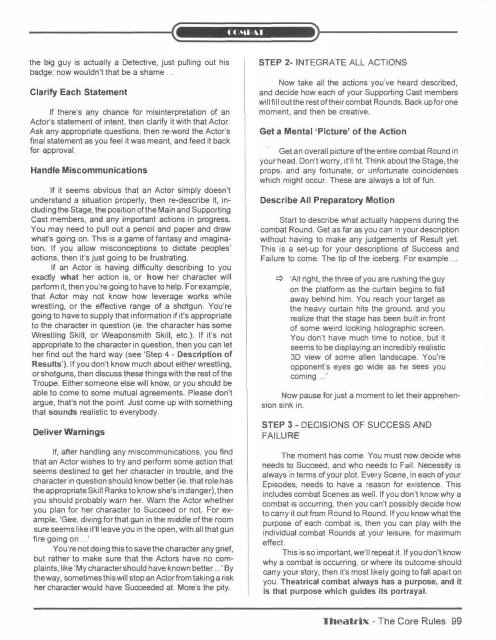Untitled - Index of - Free
Untitled - Index of - Free
Untitled - Index of - Free
Create successful ePaper yourself
Turn your PDF publications into a flip-book with our unique Google optimized e-Paper software.
the big guy is actually a Detective, just pulling out his<br />
badge; now wouldn't that be a shame ...<br />
Clarify Each Statement<br />
If there's any chance for misinterpretation <strong>of</strong> an<br />
Actor's statement <strong>of</strong> intent, then clarify it with that Actor.<br />
Ask any appropriate questions, then re-word the Actor's<br />
final statement as you feel it was meant, and feed it back<br />
for approval.<br />
Handle Miscommunications<br />
If it seems obvious that an Actor simply doesn't<br />
understand a situation properly, then re-describe it, in<br />
cluding the Stage, the position <strong>of</strong> the Main and Supporting<br />
Cast members, and any important actions in progress.<br />
You may need to pull out a pencil and paper and draw<br />
what's going on. This is a game <strong>of</strong> fantasy and imagina<br />
tion. If you allow misconceptions to dictate peoples'<br />
actions, then it's just going to be frustrating.<br />
If an Actor is having difficulty describing to you<br />
exactly what her action is, or how her character will<br />
perform it, then you're going to have to help. For example,<br />
that Actor may not know how leverage works while<br />
wrestling, or the effective range <strong>of</strong> a shotgun. You're<br />
going to have to supply that information if it's appropriate<br />
to the character in question (ie. the character has some<br />
Wrestling Skill, or Weaponsmith Skill, etc.). If it's not<br />
appropriate to the character in question, then you can let<br />
her find out the hard way (see 'Step 4- Description <strong>of</strong><br />
Results'). If you don't know much about either wrestling,<br />
or shotguns, then discuss these things with the rest <strong>of</strong> the<br />
Troupe. Either someone else will know, or you should be<br />
able to come to some mutual agreements. Please don't<br />
argue, that's not the point. Just come up with something<br />
that sounds realistic to everybody.<br />
Deliver Warnings<br />
If, after handling any miscommunications, you find<br />
that an Actor wishes to try and perform some action that<br />
seems destined to get her character in trouble, and the<br />
character in question should know better (ie. that role has<br />
the appropriate Skill Ranks to know she's in danger), then<br />
you should probably warn her. Warn the Actor whether<br />
you plan for her character to Succeed or not. For ex<br />
ample, 'Gee, diving for that gun in the middle <strong>of</strong> the room<br />
sure seems like it'll leave you in the open, with all that gun<br />
fire going on .. .'<br />
You're not doing this to save the character any grief,<br />
but rather to make sure that the Actors have no com<br />
plaints, like 'My character should have known better ... ' By<br />
the way, sometimes this will stop an Actor from taking a risk<br />
her character would have Succeeded at. More's the pity.<br />
STEP 2- INT EGRATE ALL ACTIONS<br />
Now take all the actions you've heard described,<br />
and decide how each <strong>of</strong> your Supporting Cast members<br />
will fill out the rest <strong>of</strong> their combat Rounds. Back up for one<br />
moment, and then be creative.<br />
Get a Mental 'Picture' <strong>of</strong> the Action<br />
Get an overall picture <strong>of</strong> the entire combat Round in<br />
your head. Don't worry, it'll fit. Think about the Stage, the<br />
props, and any fortunate, or unfortunate coincidences<br />
which might occur. These are always a lot <strong>of</strong> fun.<br />
Describe All Preparatory Motion<br />
Start to describe what actually happens during the<br />
combat Round. Get as far as you can in your description<br />
without having to make any judgements <strong>of</strong> Result yet.<br />
This is a set-up for your descriptions <strong>of</strong> Success and<br />
Failure to come. The tip <strong>of</strong> the iceberg. For example ...<br />
c:::> 'All right, the three <strong>of</strong> you are rushing the guy<br />
on the platform as the curtain begins to fall<br />
away behind him. You reach your target as<br />
the heavy curtain hits the ground, and you<br />
realize that the stage has been built in front<br />
<strong>of</strong> some weird looking holographic screen.<br />
You don't have much time to notice, but it<br />
seems to be displaying an incredibly realistic<br />
3D view <strong>of</strong> some alien landscape. You're<br />
opponent's eyes go wide as he sees you<br />
coming .. .'<br />
Now pause for just a moment to let their apprehen<br />
sion sink in.<br />
STEP 3 - DECISIONS OF SUCCESS AND<br />
FAILURE<br />
The moment has come. You must now decide who<br />
needs to Succeed, and who needs to Fail. Necessity is<br />
always in terms <strong>of</strong> your plot. Every Scene, in each <strong>of</strong> your<br />
Episodes, needs to have a reason for existence. This<br />
includes combat Scenes as well. If you don't know why a<br />
combat is occurring, then you can't possibly decide how<br />
to carry it out from Round to Round. If you know what the<br />
purpose <strong>of</strong> each combat is, then you can play with the<br />
individual combat Rounds at your leisure, for maximum<br />
effect.<br />
This is so important, we'll repeat it. If you don't know<br />
why a combat is occurring, or where its outcome should<br />
carry your story, then it's most likely going to fall apart on<br />
you. Theatrical combat always has a purpose, and it<br />
is that purpose which guides its portrayal.<br />
Theatrix - The Core Rules 99



